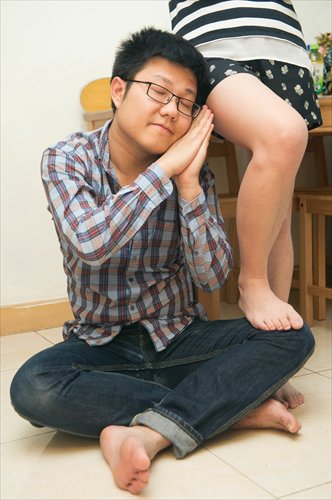

Men who act cute may be helping their state of mental health. (Photo: GT/Li Hao)
Forget manliness, sajiao takes the pressure off
When Yuan Hang, a 26-year-old sales manager, realized he had forgotten his girlfriend Xu Tiantian's birthday earlier this month, he was already two days late. His girlfriend hadn't said a word to him, and he was in a panic.
Yuan decided to purchase a large bunch of roses and an amber necklace for Xu. He went to her home on the third day after her birthday. With one knee resting on the floor, he began to do sajiao, a Chinese word that is best used to describe the act of exuding boyish innocence or charm to get something in return - in this case, a happy girlfriend.
The World of Chinese magazine refers to sajiao as a "temper tantrum art" primarily executed by females in relationships. But in many modern Chinese relationships, the tables are turning - and despite the way it may look, experts are saying it can be a good thing for men's mental health.
Yuan's sajiao looked like this: He spoke to Xu in a soft, pathetic and timid voice, raising his eyebrows slightly to catch her reaction.
"I didn't mean to forget," he said. "Would you please forgive me? I was so exhausted from trying to choose the right present for you and so worried about you being mad at me, and I have not slept well for two days."
Xu responded by laughing. Her anger was driven away by what she said was a tall, strong man's pathetic and "girly" act. Xu used to think the concept of sajiao was stereotypically feminine because it means acting cute and saying child-like or flirty words, or pouting or whining when they are begging for forgiveness, thirsty for attention, or simply wanting to express love for their partner.
Yuan told Metropolitan that when he gave his girlfriend a dose of sajiao, he was embarrassed, but it saved him a lot of energy from a potential confrontation.
"I admit it was less manly than how I normally act, but it did make me feel relieved because it made up for my mistake," Yuan said, adding that he didn't feel like it had any long-term effects on his masculinity. He only does sajiao when he is with Xu, and not very often.
Li Yang, a registered psychological consultant, told Metropolitan that for men, sajiao is namely good for relieving stress and can stave off depression.
"A mature man traditionally has to give off the impression that he can take on a lot of pressure, so it can be good to do sajiao in front of people who are closest to them," Li said.
Li said men's act of sajiao indicates a psychological need that should be fulfilled, and the female partner should learn to interpret her man's needs when he does sajiao, whether it's the need to be comforted or to receive attention.
Wang Ting, 27, said her boyfriend is a "sajiao master." She was not sure what to react to it at first, but now she has become used to it and is glad to see "a tall and strong man in his early 30s pout and act cute and childishly charming."
"When he is around his friends, he acts like a normal man, but when it's only me and him, it is kind of a disaster," she joked.
Wang said that although they seldom fight - because every time they are about to quarrel, her boyfriend diminishes arguments by acting "shameless" like a puppy, hugging her, and rubbing her head and face with his own head - there is a downside. She is concerned she's missing out on masculinity and maturity.
But Wang is torn. She said her boyfriend's antics are both "funny and annoying."
Li warned that for girlfriends like Wang, it's best not to humiliate their partners for a bit of sajiao here and there, or it could hurt their self esteem.
Women spend more than men in over 60% of Chinese households
2015-03-09Men race in high heels for Women‘s Day
2015-03-09More Chinese men willing to chase unrequited love: survey
2015-02-13Chinese men don‘t mind playing second fiddle
2015-02-12Missing ‘brides‘, a hidden hurt for ‘leftover‘ men
2015-01-19Figures reveal most popular shows for men and women
2014-12-31It‘s official - men are idiots!
2014-12-15Copyright ©1999-2018
Chinanews.com. All rights reserved.
Reproduction in whole or in part without permission is prohibited.